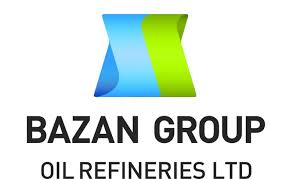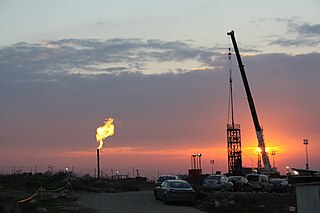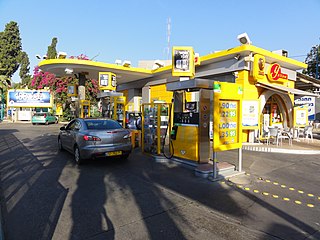Mobil is a petroleum brand owned and operated by American oil and gas corporation ExxonMobil. The brand was formerly owned and operated by an oil and gas corporation of the same name, which itself merged with Exxon to form ExxonMobil in 1999.

Yedioth Ahronoth is a national daily newspaper published in Tel Aviv, Israel. Founded in 1939 in British Mandatory Palestine, Yedioth Ahronoth is the largest paid newspaper in Israel by sales and circulation.

Israel Electric Corporation is the largest supplier of electrical power in Israel and the Palestinian territories. The IEC builds, maintains, and operates power generation stations, sub-stations, as well as transmission and distribution networks in Israel.

Paz Oil Company Ltd. is the largest Israeli fuels company. Paz distributes gasoline and other petroleum products through a network of gas stations, as well as LPG and natural gas for home use through its subsidiary PazGaz. Paz operates combined cafes and stores in many gas stations, through its subsidiary Yellow. It also owns the supermarket chains Freshmarket and Super Yuda.

Jerusalem Light Rail is a light rail system in Jerusalem. Currently, the Red Line is the only one in operation, the first of several light rail lines planned in Jerusalem.
Elco Ltd. is an international conglomerate holding company headquartered in Tel Aviv, Israel. The company was founded in 1949 by Alexander Salkind, and has been managed since its establishment by three generations of the Salkind family. It is the parent company of Electra, Electra Consumer Products, Electra Real Estate, Supergas and others. By 2021 the company’s subsidiaries were active in 17 countries, with more than 21,000 employees, and a production site in Israel where it manufactures air conditioning units and electromechanical equipment.

BAZAN Group,, formerly Oil Refineries Ltd., is an oil refining and petrochemicals company located in Haifa Bay, Israel. It operates the largest oil refinery in the country. ORL has a total oil refining capacity of approximately 9.8 million tons of crude oil per year with a Nelson complexity index of 9. ORL provides a variety of products used in industrial operations, agriculture and transportation. ORL is Israel's largest integrated refining and petrochemical facility. The company also provides storage and transportation services for oil fuel products, as well as electricity and steam to industrial customers in the region.
The Tamar gas field is a natural gas field in the Mediterranean Sea off the coast of Israel. The field is located in Israel's exclusive economic zone, roughly 80 kilometres (50 mi) west of Haifa in waters 1,700 metres (5,600 ft) deep. The Tamar field is considered to have proven reserves of 200 billion cubic metres of natural gas, while the adjoining Tamar South field has 23 billion cubic metres. Together, they may have an additional 84 BCM of "probable" reserves and up to 49 BCM of "possible" reserves. At the time of discovery, Tamar was the largest find of gas or oil in the Levant basin of the Eastern Mediterranean Sea and the largest discovery by Noble Energy. Since Tamar's discovery, large gas discoveries have been made in other analogous geological formations dating back to the Oligocene–Miocene epoch in the Levant basin. Because Tamar was the first such discovery, these gas containing presalt formations have become collectively known as Tamar sands.
Ashdod Oil Refinery situated in the coastal city of Ashdod is the second largest oil refinery in Israel. It is located in the industrial zone in the northern part of the city, nearby the Port of Ashdod. As of 2014, it has an annual refining capacity of 5.4 million tons of oil, with a Nelson complexity index of 9.8.

The Meged oil field is an oil field that was first discovered in the 1980s but declared to not be commercially viable at the time. In 2004, Givot Olam Oil declared to have made it commercially viable to drill. It is one of the largest on-shore oil fields in Israel. It began production in 2010 and produces oil as well as some natural gas. Its proven oil reserves are about 1,525 million barrels.
Sara and Myra were two Israeli offshore drilling licenses located west of Netanya, Israel. The licenses expired on July 13, 2015. Exploratory drilling in the license area in 2012 was unsuccessful, but seismic studies indicated the possibility of oil and gas at deeper strata that were not explored.
The Nahal Zin fuel leak was a severe ecological disaster caused in June 2011 when a backhoe loader struck and ruptured an underground fuel pipeline in southern Israel. 1.5 million liters of jet fuel leaked into the surrounding soil, resulting in localized soil contamination, damage to nearby flora, and wasted fuel. It is considered the worst ecological disaster ever to befall a nature reserve in the history of the State of Israel.

Shlomo Group is one of the largest investments and holdings groups in Israel, consists of automotive, real estate, telecom, insurance, shipyards and logistics sectors. The group was founded in 1974 by Shlomo Shmeltzer. The group's consolidated turnover is amounted to ILS 7 billion, as of 2017. Today the company is headed by Asi Shmeltzer, the son of Shlomo Shmeltzer who was the company's founder, while his wife Atalia Shmeltzer acts as the group's owner.
Tsahi Merkur is an Israeli businessman. He serves as chairman of the Israel Parking Association on behalf of the Chamber of Commerce.
Palestine produces no oil or natural gas and is predominantly dependent on the Israel Electric Corporation (IEC) for electricity. According to UNCTAD, the Occupied Palestinian Territory "lies above sizeable reservoirs of oil and natural gas wealth" but "occupation continues to prevent Palestinians from developing their energy fields so as to exploit and benefit from such assets." In 2012, electricity available in West Bank and Gaza was 5,370 GW-hour, while the annual per capita consumption of electricity was 950 kwh. National sources only produce 445 GWh of electricity, supplying less than 10% of demand. The only domestic source of energy is the disputed Gaza Marine gas field, which has not yet been developed. Palestinian energy demand increased rapidly, increasing by 6.4% annually between 1999 and 2005. Future consumption of electricity is expected to reach 8,400 GWh by 2020 on the expectation that consumption will increase by 6% annually.

Natural gas in Israel is a primary energy source in Israel, mainly utilized for electricity production and to lesser degree in industry. Israel began producing natural gas from its own offshore gas fields in 2004. Between 2005 and 2012, Israel had imported gas from Egypt via the al-Arish-Ashkelon pipeline, which was terminated due to Egyptian Crisis of 2011-14. As of 2017, Israel produced over 9 billion cubic meters (bcm) of natural gas a year. Israel had 199 billion cubic meters of proven reserves of natural gas as of the start of 2016. In early 2017, Israel began exporting natural gas to the Kingdom of Jordan.

Gideon Bickel is an Israeli businessman. Bickel was the owner of Flora Stock Exchange in Belgium. He was chairman and owner of Carmel Agrexco.
Mordechai Maurice "Moti" Ben-Moshe is an Israeli businessman. He is the chairman and CEO of Germany holding company Extra Holding, which controls Extra Energy. He is also the owner of Alon Blue Square, and briefly served as chairman of IDB Group.

Uzi Yemin is an Israeli-American entrepreneur, industrialist and philanthropist best known as the founder and Executive Chairman of Delek US.

Yellow is an Israeli chain of Convenience stores owned by Paz Oil Company Ltd. and established in 1999. As of 2021, the chain operates about 280 convenience stores throughout Israel. Most stores operate 24 hours a day, seven days a week. They mainly sell food-to-go and food for complementary purchases. Like with other convenience stores, the products are priced slightly higher than at Grocery stores and Supermarkets to account for the convenience of immediate availability.












